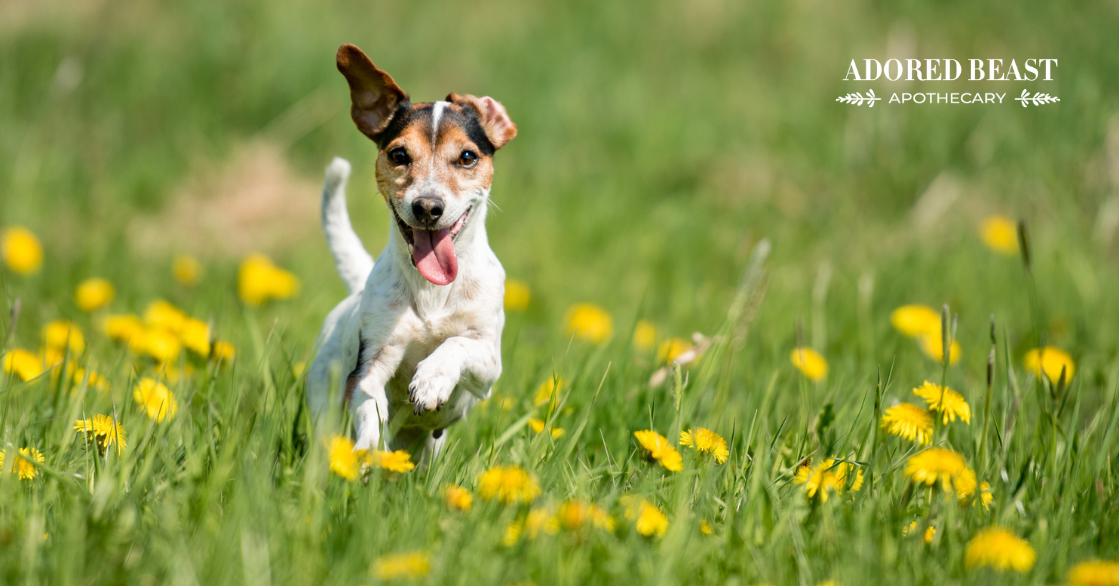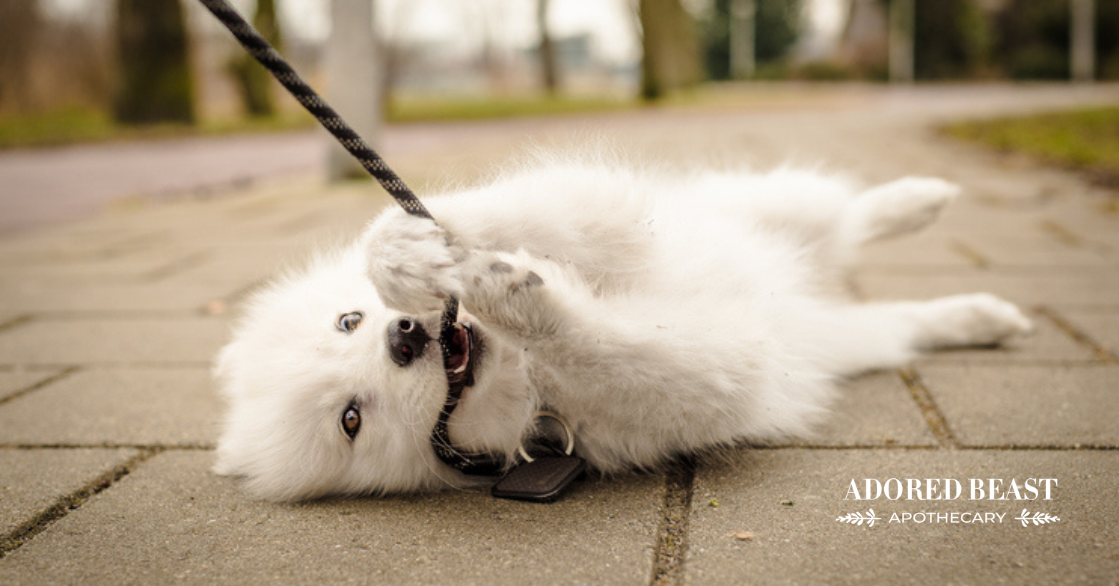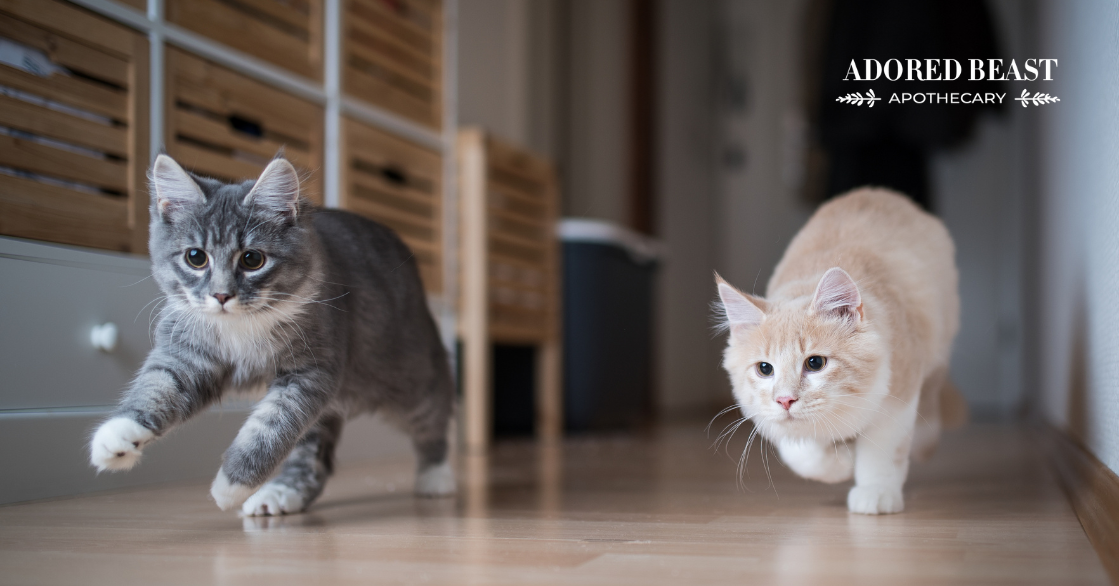With the weather warming up, and spring flowers starting to bud, it won’t be long before we see dandelions peeking up through the grass.
For many years, for many people, this has been a rather unwelcome occurrence… but we want to try and change your perspective!!
Often dismissed as a pesky weed, dandelion is a powerful herbal remedy that offers a plethora of health benefits for our furry companions. Instead of looking at it as something to get rid of, perhaps it’s time to look at all the ways our animals (and us too) can take advantage of this pretty flower. It’s time to look at the benefits of dandelions for dogs and cats.
What are Dandelions?
Dandelion (Taraxacum officinale) is a common flowering plant found in many parts of the world. Despite its more recent reputation as a nuisance in lawns and gardens, dandelion has been used for centuries in traditional medicine for its medicinal properties. Every part of the dandelion plant, from its roots to its leaves and flowers, offers unique health benefits for pets.
Yes, dogs and cats can both eat dandelions!
And they should!
Firstly, they’re packed full of vitamins and minerals. Vitamins A, C, D, and K, zinc, phosphorous, potassium, calcium, magnesium are all found in dandelions. They even contain antioxidants!
🐝 Fun Fact: Bees visit dandelions for food. Dandelions are an important source of pollen and nectar for bees, and they bloom from early spring until just before winter. Each flower contains up to 100 florets, each of which is packed with nectar and pollen.
Benefits of Dandelion for Dogs and Cats
Why do we like dandelions for dogs and cats?
- For Liver and Kidney Support: Dandelion is renowned for its liver-cleansing properties, promoting detoxification and improving liver function in dogs and cats. It helps remove toxins from the body and supports overall liver health. (Read more on supporting the liver here!)
- For Digestive Health: Dandelion acts as a gentle digestive aid, stimulating appetite, promoting healthy digestion, and relieving gastrointestinal issues such as bloating, gas, and constipation in pets. It also helps support bile secretion.
- For the Anti-inflammatory Effects: The anti-inflammatory properties of dandelion make it beneficial for pets with arthritis, joint pain, or inflammatory conditions. It can help reduce inflammation and alleviate discomfort associated with these conditions.
- For its Diuretic Properties: Dandelion acts as a natural diuretic, promoting urine production and supporting kidney function. It helps flush out excess fluids and toxins from the body, reducing the risk of urinary tract infections and kidney stones.
- For its Antimicrobial Properties: Thanks to its antimicrobial properties, dandelion can help support the body’s ability to fight infection.
- For a Nutritional Boost: Because dandelion is rich in vitamins (A, C, and K) and minerals (iron, calcium, potassium), it’s a nutritious addition to our pets’ diets. It supports overall health and vitality, providing essential nutrients for optimal well-being.
How to Use Dandelion for Dogs and Cats
Want to talk about versatility? You can use the entire dandelion to create a natural dog remedy – the flower, roots, and leaves! And you can use them al types of ways!
Fresh leaves: Fresh dandelion leaves and flowers can be washed thoroughly and offered as a tasty treat for dogs and cats. You can also chop them finely and mix them into your pet’s food for added nutrition. A leaf or 2 for small dogs is good, a few more for larger dogs.
Dried leaves or root: Don’t have fresh on hand? Don’t worry. Simply crumble some dried leaves or root and mix it into your animal’s dinner. Work up to 1 tsp per 20 pounds of body weight.
Tea: Infuse between 5g-30g (depending on the size of your dog) of dandelion in 8oz of hot water. Allow the liquid to steep and then strain the dandelion. Once it has cooled, add it your dog’s meals up to three times a day as needed. In regards to guidance on measurements, use approximately one third of a cup per 20 pounds of your dog’s weight.
Herbal Formulas: Dandelion is often included in herbal formulas and blends designed to support liver health, digestion, and overall wellness in pets. Look for reputable brands that use high-quality, organic ingredients. Our Liver Tonic contains it!
Topically: With its great antimicrobial properties, dandelion is great to use externally as well as internally. We like to use these to help clean out and soothe minor cuts, scraps, or burns. Simply take some of that brewed tea, let it cool, and soak it on the skin.
Things to Keep in Mind
Dandelions are so good for our animals, but as with any other herb, there are things to remember.
- Start slow. If your animal has never had dandelion before, introduce it slowly.
- Beware of pesticides. If you pick your own, make sure that you don’t use pesticides on your lawn, and try to determine if pesticides are used on the lawns around you (they can travel quite far on the wind or in the soil). These are toxic, so you don’t want to feed those to you beloved beast.
- Make sure there’s always water. Because of the diuretic properties, you want to make sure that there is always water on hand for your animal to drink!
Dandelion is much more than just a common weed—it’s a potent herbal remedy packed with health benefits for our animals. From liver support to digestive health and beyond, dandelion offers a natural solution for promoting wellness in our beloved beasts. By incorporating dandelion for dogs and cats, we can help our furry companions thrive and enjoy optimal health and vitality for years to come.












![[RESEARCH] Is Herbicide Safe for Dogs?](https://blog.adoredbeast.com/wp-content/uploads/2025/06/herbicides-safe-for-dogs-103x55.png)